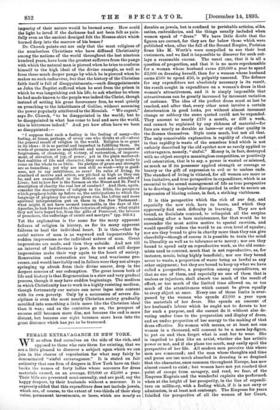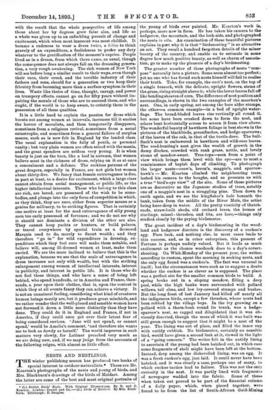FEMALE EXTRAVAGANCE IN NEW YORK.
WE so often find ourselves on the side of the rich, and opposed to those who rate them for existing, that we are a little pleased to discover a subject upon which we can join in the chorus of reprobation for what may fairly be denominated "sinful extravagance." It is stated on fair authority that one firm of drapers in New York have on their books the names of forty ladies whose accounts for dress materials exceed, on an average, $10,000 or £2,000 a year. Their bills are presented semi-annually, and are paid, say the happy drapers, by their husbands without a murmur. It is expressly added that this expenditure does not include jewels, which are, of course, to the extent of two-thirds of their shop value, permanent investments, or laces, which are nearly as durable as jewels, but is confined to perishable articles, silks, satins, embroideries, and the things usually included when women speak of "dress." We have little doubt that the figures are correct, for they are far below those which were published when, after the fall of the Second Empire, Parisian firms like M. Worth's were compelled to sue their beat customers, and we find it impossible to discover for such out- lays a reasonable excuse. The usual one, that it is all a question of proportion, and that it is no more reprehensible for a woman whose husband earns 220,000 a year to spend £2,000 on dressing herself, than for a woman whose husband earns £500 to spend £50, is palpably unsound. The defence for any expenditure not absolutely necessary is its result, the result sought in expenditure on a woman's dress is that woman's attractiveness, and it is simply impossible that attractiveness can be greatly increased by incessant variation of costume. The idea of the perfect dress must at last be reached, and after that, every other must involve a certain deterioration in good looks, yet without almost incessant change or robbery the sums quoted could not be expended. They amount to nearly £170 a month, or £38 a week, and cannot be explained by any richness of material—for furs are nearly as durable as laces—or any other quality in the dresses themselves. Style costs much, but not all that. The only conceivable explanation is rapidity of change, and in that rapidity is waste of the senseless kind which is not unfairly described by the old epithet now so rarely applied to extravagance, namely, " sinful." Money is, in fact, destroyed with no object except a meaningless competition, or positively evil ostentation, that is to say, a power is wasted or misused, as much as if its possessor applied strength or courage or beauty or the gift of expression to evil or to useless ends. The standard of living is vitiated, for all women are more or less imitative, and true perspective in expenditure, which is as essential to the sound management of life as true perspective is to drawing, is hopelessly disregarded in order to secure an impression of blazing colour, in fact, a striking visibleness.
It is this perspective which the rich of oar day, and especially the new rich, have to learn, and which they apparently find such difficulty in learning. They are not bound, as Socialists contend, to relinquish all the surplus remaining after a bare maintenance, for that would be to surrender the most active motive to special exertion, and would speedily reduce the world to an even level of squalor; nor are they bound to give in charity more than they can give cheerfully—though of course it is possible to train the mind to liberality as well as to tolerance or to mercy ; nor are they bound to spend only on reproductive work, as the old econo- mists used to contend, much that is not reproductive, as, for instance, music, being highly beneficial ; nor are they bound never to waste, a proportion of waste being as lawful as any other enjoyment; but they are bound to keep up what we have called a perspective, a proportion among expenditures, so that no one of them, and especially no one of them that is useless or injurious, shall absorb too much of the result of effort, or too much of the limited time allowed us, or too much of the attentiveness which cannot be given equally to every object at once. Every one of those limits is over- passed by the woman who spends £2,000 a year upon the materials of her dress. She spends an amount of her husband's labour which he ought not to devote to her for such a purpose, and she cannot do it without also de- voting undue time to the preparation and display of dress, and an undue proportion of her energy to the making of that dress effective. No woman with means, or at least not one woman in a thousand, will consent to be a mere lay-figure, to put on and then forget what is sent her to wear. She is impelled to plan like an artist, whether she has artistic power or not, and if she plans too much, may easily spoil the perspective of her life. All modern men perceive this where men are concerned ; and the man whose thoughts and time and purse are too much absorbed in dressing is so despised that the character, once common throughout Europe, has now almost ceased to exist ; but women have not yet reached that point of escape from savagery, and read, we fear, of the Empress Eugenie and the wonderful exploits she performed. when at the height of her prosperity, in the line of expendi- ture on millinery, with a feeling which, if it is not envy or admiration, is at least not contempt. The Empress for years falsified the perspective of all the women of her Court.
with the result that the whole perspective of life among those about her by degrees grew false also, and life as a whole was given up to an enfeebling pursuit of change and excitement, which when most innocent was most childish. It became a rudeness to wear a dress twice, a Utise to think gravely of an expenditure, a foolishness to prefer any duty whatever to the gratification of the moment's caprice. People lived as in a dream, from which there came, as usual, though the consequence does not always fall on the dreaming genera- tion, a very rough awakening. The rich women of New York will see before long a similar result to their ways, even though their race, their creed, and the terrible industry of their fathers and sons, should for a generation or two keep their frivolity from becoming more than a surface symptom in their lives. Waste like theirs of time, thought, energy, and power on trumpery effects, cannot go on for fifty years without im- pairing the morale of those who are to succeed them, and who ought, if the world is to keep sweet, to outstrip them in the possession of all those qualities.
It is a little hard to explain the passion for dress which bursts out among women at intervals, increases till it excites the horror of moralists, and then temporarily disappears, -sometimes from a religious revival, sometimes from a social catastrophe, and sometimes from a general failure of surplus means, such as is now felt in England by the landed class. The usual explanation is the folly of youth, or personal vanity ; but very plain women are often seized with the mania, and the great spenders are seldom very young. It is when .beauty is just on the turn, like a leaf in autumn, that women believe most in the richness of dress, relying on it as at once a concealment and a defence. The reckless patrons of the great drapers, especially in France, are not girls but women about thirty-five. We fancy that female extravagance is due, in part at least, to a desire for excitement, which a large class cannot obtain from social management, or public life, or the higher intellectual interests. Those who belong to this class are rich, are bored, are possessed of the wish to be some- bodies, and plunge into the only form of competition in which, as they think, they are sure, either from superior means or a genius for millinery, to be striking figures. That is certainly one motive at least for the mad extravagance of silly young men too early possessed of fortunes; and we do not see why it should not dominate a division of the other sex also. They cannot keep yachts or hunters, or build palaces, or travel everywhere by special train as a deceased Marquis used to do, merely to flaunt wealth ; and they therefore " go in" for wild expenditure in dressing, ex- penditure which they feel sure will make them notable, and believe will, among ill-dressed women at least, make them envied. We are the more inclined to believe that this is the explanation, because we see that the scale of extravagance in dress increases not only with wealth, but with the striking enlargement among women of intellectual interests, interest in publicity, and interest in public life. It is those who do not feel these things, and who have a sense of being left behind, who spend hundreds, or in America and France, thou- sands, a year upon their clothes, that is, upon the contest in which they at all events fancy they can achieve a victory. It is not an unnatural feeling, considering what kind of creatures human beings mostly are, but it produces great mischiefs, and we rather wonder that the well-placed and sensible women have not frowned it down a little more distinctly than they have done. They could do it in England and France, if not in America, if they could once get over their latent fear of being considered envious. Jane will not spend, or cannot spend,' would be Amelia's comment, ' and therefore she wants -me to look as dowdy as herself.' The world improves in such matters very slowly, for Latimer preached very much as we are doing now, and, if we may judge from the accounts of 'the following reigns, with almost as little effect.











































 Previous page
Previous page